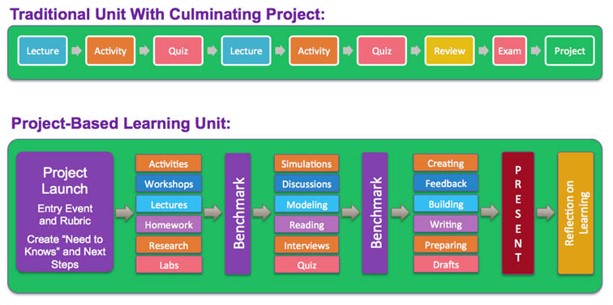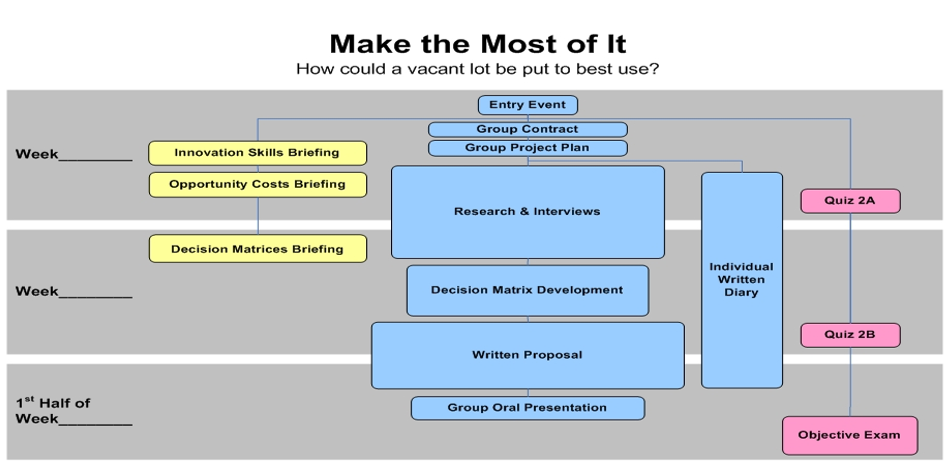Schools have the opportunity to breed the next generation of executives, innovators and changers. HSB provides the tools and skills necessary for students to succeed in and outside of the classroom. What school doesn’t want that?
High School of Business™ (HSB) does business like business does business. Teams of students work on real projects, providing an authentic reason for learning. It’s engaging, it’s challenging, and it naturally teaches the 21st century skills necessary for success in college and career now and in the future.
How do cities encourage new businesses to open? Which cell phone service is the best choice? How can a small business use its story to grow business? Should a company manufacture in another country? Students work through real questions like these in each HSB course.
Each course is built around MBA Research’s National Standards for Business Administration, which are based on business practitioner research, as well as academic standards. Course content is accelerated, with outcomes reaching grade 14. The six required courses equal a minimum of 405 credit hours total. College-level learning paves the way for college credit opportunities.
College Credit Opportunities
This project-based business course develops student understanding and skills in such areas as business law, economics, financial analysis, human resources management, information management, marketing, operations, and strategic management. Through the use of projects, students acquire an understanding and appreciation of the business world. They develop a biography of a local business, examine factors affecting business profit and risk, conduct an environmental scan of the business community, and investigate business activities. Current technology will be used to acquire information and to complete the projects. Throughout the course, students are presented problem-solving situations for which they must apply academic and critical-thinking skills. Formal reflection is an on-going component of the course.
This project-based business course develops student understanding and skills in such areas as economics, operations, and professional development. Through the use of six projects, students acquire an understanding and appreciation of economic decision-making in the business world as well as augmenting their knowledge of entrepreneurial contributions. Current technology will be used to acquire information and to complete the projects. Throughout the course, students are presented problem-solving situations for which they must apply academic and critical-thinking skills. Formal reflection is an on-going component of the course.
This project-based business course develops student understanding and skills in such areas as channel management, marketing-information management, market planning, pricing, product/service management, promotion, and selling. Through the use of five projects, students acquire an understanding and appreciation of marketing activities. Current technology will be used to acquire information and to complete the projects. Throughout the course, students are presented problem-solving situations for which they must apply academic and critical-thinking skills. Formal reflection is an on-going component of the course.
Principles of Finance furthers student understanding of two specific business activities—accounting and finance—that were introduced in an earlier High School of Business™ course, Principles of Business. Through multiple projects, students make connections between accounting, with an emphasis on cash flow, and finance, with an emphasis on decision-making. Students acquire an understanding of financial statements, calculate financial ratios, and make business decisions based on their interpretation of those financial statements and ratios. In addition, students determine the impact of financial transactions on the accounting equation and examine business-financing options.
This project-based business course furthers student understanding of management and management functions. Through individual and team activities, students make connections between management and business success. A significant portion of the Principles of Management course is also devoted to in-depth planning and preparations necessary for successful operation of the students’ class business, to be actualized in the HSB capstone Business Strategies course.
Business Strategies, which is the capstone course for the High School of Business™ program, develops student understanding and skills in such areas as business law, entrepreneurship, financial analysis, human resources management, and strategic management. By planning, organizing, staffing, directing, and controlling business activities, students acquire a realistic understanding of what is required to open and successfully run a business. They develop a business plan; recruit, interview, select, and hire staff; supervise staff; control use of resources; and evaluate the results of the business effort. Throughout the course, students make decisions and use problem-solving skills. Formal reflection is an on-going component of the course.
9th grade course – optional
This project-based leadership course develops student understanding and skills in such areas as communication skills, emotional intelligence, operations, and professional development. Students acquire an understanding and appreciation of the need for leadership skills. The capstone activity of the course is the implementation of a service-learning project. Throughout the course, students are presented problem-solving situations for which they must apply academic and critical-thinking skills. Formal reflection is an on-going component of the course.
9th grade course – optional
This project-based financial literacy course develops student understanding and skills in such areas as economic decision-making, time value of money, financial management, and types of investments. Students acquire an understanding and appreciation of the need for personal financial management and investing. To encourage immediate implementation of financial management skills, Wealth Management utilizes an on-going project for course delivery and reinforcement. The course content is sequenced for students to develop a full understanding of their role and responsibility in their financial future. Throughout the course, students are presented problem-solving situations for which they must apply academic and critical-thinking skills.

Schools have the opportunity to breed the next generation of executives, innovators and changers. HSB provides the tools and skills necessary for students to succeed in and outside of the classroom. What school doesn’t want that?

Project-based learning is the heart of High School of Business. Projects are introduced at the beginning of the learning and provide the reason for students to learn.

The result is learning that is deep and long-lasting. These authentic experiences naturally build the 21st century skills students will need now and in the future.
Each project is designed around learning standards. Instructional resources and assessments ensure students master the content as they work in teams to find a solution to the problem they have been charged with.

Business and industry moves fast. High School of Business keeps pace with annually-updated resources delivered in a variety of formats to keep students engaged.
Regular and varied assessments ensure students master the content as they work to complete the projects.
High School of Business is a coordinated, sequenced program of study that leads to a post-secondary credential. The program delivers what students need to be successful in business careers that are necessary across all industries. It also includes focused, sustained PD; work-based learning opportunities; national and local post-secondary credit agreements; and preparation for a workplace credential.
| Perkins V | How HSB delivers |
|---|---|
| Program of study | 6-8 sequenced semester courses that can be delivered in 2-4 years |
| Focused, sustained PD | PD for course content and pedagogy (project-based learning) is focused on each course and delivered as courses roll out at the school |
| Measure of CTE program quality—states choose one of three: Post-secondary credential, Post-secondary credit, Work-based learning | HSB can meet all 3 quality indicators:
|
| In-demand sectors, occupations |
|
Think of it as a partnership. High School of Business is the curriculum that pairs with your co-curricular program. High School of Business teachers confirm that many of the projects in each High School of Business course naturally feed into competitive events. In addition, the skills that students use to work on High School of Business projects (including teamwork, leadership, and delivering oral presentations) strengthen their use of these skills, resulting in success at BPA, DECA, and FBLA competitions.
Ready to get started on incorporating High School of Business? Learn more by contacting us today!